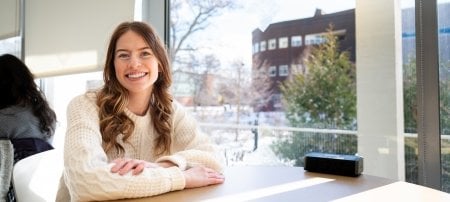Code Warriors Rev Up for Battle of the Brains
After triumphing over hundreds of code warriors from across the Midwest, a team of computer science majors from Michigan Technological University has earned a coveted slot in the worldwide 2008 Battle of the Brains.
Officially known as the ACM International Collegiate Programming Contest, the IBM-sponsored competition began this fall. Six thousand, seven hundred teams representing 1,821 universities in 83 countries competed at 213 sites worldwide.
The 100 survivors (including Michigan Tech) qualified for the World Finals, set for April 6-10 in Banff and hosted by the University of Alberta.
The contest will be held at the century-old Fairmont Banff Springs, which was modeled after a Scottish baronial chateau.
“I’m pretty ecstatic,” said team member Ryan Richards. “Banff is going to be ridiculously fun, and I’m excited about staying in a castle.”
While many universities identify team members competitively, Michigan Tech’s approach is a little more laid back. David Poplawski, the team’s advisor and an associate professor of computer science, fired off an email asking if anyone was interested.
“They just came out of the woodwork,” he said.
Members of the qualifying team, undergraduates Mikola Lysenko, Nick Smolinske and Richards, are all good students, but they also have an additional gift that doesn’t necessarily reveal itself in the classroom.
“It’s a strange talent,” says Poplawski. “Usually, the programmer’s goal is to write good, larger software programs, and there’s a whole planning and design process involved.
“This contest is the antithesis of that. You get something to work as fast as you can.”
Indeed, at the North Central North America Regionals, dozens of teams from eight states and western Ontario tried to solve nine problems in five hours, and for much of the contest, it seemed as if the team from Tech would come out on top. “We were solving a problem every 20 minutes,” Richards said.
As time was running out, several teams were tied at seven problems solved, with Michigan Tech leading with the best time. However, at the last minute, the University of Wisconsin at Madison finished an eighth problem, edging Michigan Tech out of first place.
Fortunately, because the North Central regionals are so competitive, officials awarded Tech a wild-card berth at the finals.
How will they do in April? “Well, between the three of us, we have a lot of muscle,” said Richards. “All of us have been programming for over 10 years.”
That said, teams from other counties, particularly Russia and China, train like maniacs for the competition and often take the gold.
By contrast, the night before the regionals, the Michigan Tech team relaxed at a local bowling alley. And for luck, they gave a ceremonial bath to a statue of the Buddha.
“For teams in other countries, it’s their Olympics,” Richards explained. “For us, just going is the honor.”
Tech teams have gone to the ACM International Collegiate Programming Contest finals three times before, in 2003, 2004 and once in the 1980s.
For more information, visit http://icpc.baylor.edu/icpc/.
Michigan Technological University is an R1 public research university founded in 1885 in Houghton, and is home to nearly 7,500 students from more than 60 countries around the world. Consistently ranked among the best universities in the country for return on investment, Michigan's flagship technological university offers more than 185 undergraduate and graduate degree programs in science and technology, engineering, computing, forestry, business, health professions, humanities, mathematics, social sciences, and the arts. The rural campus is situated just miles from Lake Superior in Michigan's Upper Peninsula, offering year-round opportunities for outdoor adventure.


![Tech’s annual Computing [MTU] Showcase comes to campus Oct. 2-4.](http://www.mtu.edu/news/2024/09/images/cyber-security-202110070277-banner450.jpg)

Comments